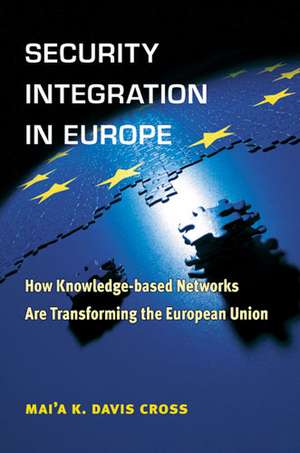Security Integration in Europe: How Knowledge-based Networks Are Transforming the European Union
Autor Mai'a Crossen Limba Engleză Hardback – 29 aug 2011
The European Union has made remarkable, unprecedented advances in both external and internal security integration. "Epistemic communities" of ambassadors, military generals, scientists, and other experts who supersede national governments in the diplomacy of security decision making are taking advantage of their shared expertise, common culture, professional norms, and frequent meetings to forge new levels of collaboration. Mai'a K. Davis Cross brings together numerous personal interviews and recent government documents across five separate case studies to construct a microsociological account of how EU governance really works and what future role the EU is likely to play internationally.
Preț: 478.92 lei
Preț vechi: 592.74 lei
-19% Nou
Puncte Express: 718
Preț estimativ în valută:
91.64€ • 95.92$ • 76.27£
91.64€ • 95.92$ • 76.27£
Carte indisponibilă temporar
Doresc să fiu notificat când acest titlu va fi disponibil:
Se trimite...
Preluare comenzi: 021 569.72.76
Specificații
ISBN-13: 9780472117895
ISBN-10: 0472117890
Pagini: 292
Ilustrații: 7 figures, 6 tables
Dimensiuni: 152 x 229 x 28 mm
Greutate: 0.59 kg
Editura: UNIVERSITY OF MICHIGAN PRESS
Colecția University of Michigan Press
ISBN-10: 0472117890
Pagini: 292
Ilustrații: 7 figures, 6 tables
Dimensiuni: 152 x 229 x 28 mm
Greutate: 0.59 kg
Editura: UNIVERSITY OF MICHIGAN PRESS
Colecția University of Michigan Press
Notă biografică
Mai'a K. Davis Cross is Assistant Professor of International Relations at the University of Southern California.
Recenzii
University Association for Contemporary European Studies Best Book Prize in Contemporary European Studies
"This book, which draws on impressive first-hand research, is highly recommended to scholars, policy makers and all those interested in understanding how security integration has been unfolding in Europe."
—Yasemin Irepoglu, EUSA Review
—Yasemin Irepoglu, EUSA Review
"Distinguishing the role of knowledge and expertise in political decision making is a long-standing challenge for scholars of international politics, including those who focus on arenas with dense networks of policy experts, such as the EU. Security Integration in Europe takes on this question, and provides a number of interesting insights into how and when epistemic communities matter for security policymaking, as well as documenting the surprising range of internal and external security issues that have been taken on by the EU in recent decades."
—Jim Walsh, H-Net Reviews
—Jim Walsh, H-Net Reviews
"The author generates a fresh and well-timed outlook on security integration through the approach of 'knowledge-based networks' as transformers of the Union."
—Ramon Loik, JCMS: Journal of Common Market Studies
—Ramon Loik, JCMS: Journal of Common Market Studies
"The author is to be commended for focusing on an often-overlooked aspect of EU policymaking: how groups of individuals who have specialized knowledge can impact the European integration process. ... [Security Integration in Europe] is valuable as a rare glimpse into the EU’s byzantine bureaucracy and technocratic operating culture."
—Political Science Quarterly
—Political Science Quarterly
Descriere
The European Union is becoming able both to protect its common borders and to contribute to global security
